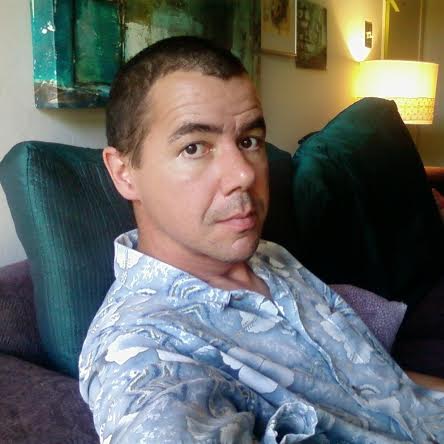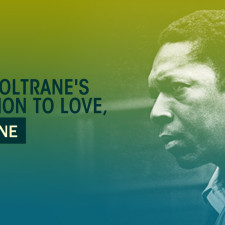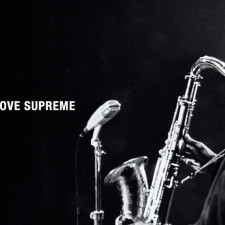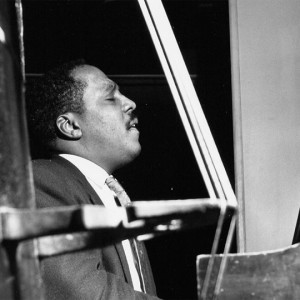By Justin Desmangles
Two days before the assassination of John F. Kennedy, Coltrane entered Van Gelder’s home studio in Englewood Cliffs, New Jersey, the same one in which he would later create A Love Supreme a year later, to record his composition, Alabama. An interpretation of Rev. Martin Luther King Jr.’s Eulogy for the Martyred Children, delivered by King at the funeral of three of the four child victims of the terrorist bombing of 16th St. Baptist Church, Birmingham, earlier that year, Coltrane further aligned himself with a commitment toward peace and spiritual unity. These principles most especially embodied as the practice and discipline of love in its most divine and expansive emanation. This critically important recording is also primary key in an understanding A Love Supreme, as it affirms the opening of Coltrane’s own heart toward a more inclusive, universal, and ultimately cosmic understanding of love as a religious principle, rather than a secular one, as well as his fidelity to King’s message and moral voice.
On Love and Revolution…
The chaos and tumult of a world in great disorder, reflected in the radical and often polarizing changes happening in the emerging aesthetics of jazz and its attendant culture during this period, are heard in the increasing sense of profound, burning, urgency Coltrane felt about his own music. Coltrane’s belief in music’s inherent power to heal the soul, bringing about a heightened sense of spiritual reality became increasingly paramount. In the liner notes and poem of A Love Supreme, Coltrane addresses his listener-reader directly on these issues in remarkably personal terms, albeit without detailing his own struggles too intimately. A quality of dignity and self-respect sorely missing from today’s art world. Again, the origins of A Love Supreme clearly reside in this desire, self-expressed, to heal the world. Coltrane’s own personal biography, not unlike that of his disciple Albert Ayler, includes anointment by the Holy Spirit, at least as Coltrane understood it. This communion leads Coltrane to seek what I would call a liturgical language of holy music, one that will bring, he believes, as did Ayler, the world to a lasting peace. A music in harmony with love’s guiding principles, which for Coltrane is the emanation of God’s will as a totalizing force. Indeed, as the total binding force of all creation in the universe. Coltrane’s insistent poetic refrain of it all being with God, no matter what, sounds a bit more like Hegel, one of Malcom X’s favorite philosophers, than King. Nevertheless, A Love Supreme is without a doubt, a holy music questing to bring about the unity of all humanity, peace among nations through love’s liberating powers.
On February 21, 1965, less than two months after the recording of A Love Supreme, Malcolm X is assassinated in the Audubon Ballroom, Harlem, New York. Coltrane had been in the Van Gelder studio just days before recording “Nature Boy,” a lyric which, when taken in the context of this discussion, does much to illustrate the abiding concern of Coltrane’s sense of mission and purpose.
There was a boy
A very strange enchanted boy
They say he wandered very far
Very far, over land and sea
A little shy and sad of eye
But very wise was he
And then one day, a magic day
He passed my way, and while we spoke
Of many things, fools and kings
This he said to me
“The greatest thing you’ll ever learn
Is just to love and be loved in return”
To love and be loved in return. No simple task, really, given the increasingly violent state of things. Coltrane’s take on the music and lyrics of “Nature Boy” is that of an ecstatic, celebrating the possibility of learning this eternally valuable lesson as well as teaching it, again and again. By this stage in his life, Coltrane was indeed that “strange, enchanted” figure the song speaks of, having walked life’s journey along a mysterious and often beguiling path, emerging whole and, in his own sense, reborn in God’s image.
For many black artists and intellectuals, the aforementioned Amiri Baraka in particular, the terrifying and violent death of Malcolm X, one of the greatest minds this country has ever produced, caused more than just pause and reflection. The event brought about a tremendous and truly radical reassessment of the world we share and in many cases do not, depending on race, class, education, and color. A younger generation of black leaders, inspired by Malcolm X and his own transformation, began to take an even stronger hold of the new music Coltrane played, and the new music he had inspired in others, now being openly called the avant-garde, as the clarion call for this vibrant new chapter in the struggle for self-determination. Now that struggle meant an alignment with the third world, the liberation movements against imperialism, which Malcolm X had described as “the slave-system of the West” in his last recorded speech, and most certainly the newly liberated countries of Africa and Asia. Those that had cast off the yoke of colonialism through revolutionary warfare.
As the decade progressed, Coltrane’s music becoming increasingly explicit in its magical, ritual and religious elements. Compositions took their titles, as with A Love Supreme, from the very principles they intended to convey, often cosmic, more often esoteric. Selflessness, Compassion, Serenity, Leo, Peace on Earth, Om, Manifestation, Reverend King, Lead Us On, Seraphic Light, Sun Star, to name but a very few.
Coltrane’s untimely death in the summer of 1967 created a vacuum in the jazz world. His stature as an oracular figure had been unparalleled, save for that of Charlie Parker in the 1940’s. Viewed by many as a messianic figure, he still is by some, his sudden absence was met with great despair, his death still being mourned today, as with King, as with Malcolm X. Earlier in that same year, April 4, King would deliver the sermon, “Beyond Vietnam,” solidifying the bonds of black American struggle for human rights at home with that of the oppressed throughout the world.
I am convinced that if we are to get on the right side of the world revolution, we as a nation must undergo a radical revolution of values. We must rapidly begin…we must rapidly begin the shift from a thing-oriented society to a person-oriented society. When machines and computers, profit motives and property rights, are considered more important than people, the giant triplets of racism, extreme materialism, and militarism are incapable of being conquered.
. . .
A true revolution of values will soon look uneasily on the glaring contrast of poverty and wealth. With righteous indignation, it will look across the seas and see individual capitalists of the West investing huge sums of money in Asia, Africa, and South America, only to take the profits out with no concern for the social betterment of the countries, and say, ‘This is not just.’ It will look at our alliance with the landed gentry of South America and say, ‘This is not just.’ The Western arrogance of feeling that it has everything to teach others and nothing to learn from them is not just.
A true revolution of values will lay hand on the world order and say of war, ‘This way of settling differences is not just.’ This business of burning human beings with napalm, of filling our nation’s homes with orphans and widows, of injecting poisonous drugs of hate into the veins of peoples normally humane, of sending men home from dark and bloody battlefields physically handicapped and psychologically deranged, cannot be reconciled with wisdom, justice, and love. A nation that continues year after year to spend more money on military defense than on programs of social uplift is approaching spiritual death.
To be clear, Coltrane had presaged such vision. His music, A Love Supreme in particular, is finally, in the last analysis, the total artistic crystallization of the political, social, and ultimately spiritual, thought both Malcolm X and later King would come into.
As a people still steeped in that cauldron of struggle, faced with many of the same issues today, it is imperative that we not only celebrate the great achievement that is A Love Supreme, but also apply a powerfully deciphering attitude of interpretation when aligning it with the many meanings it represents, most importantly love, which is largely extra-musical.
The relentless propulsive drive of A Love Supreme, Elvin Jones, drums, Jimmy Garrison, bass, its cascade of kaleidoscopic harmonies, McCoy Tyner, piano, and explosive, devotional ecstasy, Coltrane, tenor sax, is much more than a landmark in jazz. It is a towering work in the progress of Western civilization towards a true understanding of human freedom and its possibilities. To consider it outside of its social and political contexts would render it meaningless. To not align the full arc and panorama of Coltrane’s entire recorded output as an artist with the struggle of Black America towards full human rights, and that struggle with the global quest for the same, is finally not to understand Coltrane at all.
Consider this fact. The John Coltrane Quartet recorded A Love Supreme on all but the same day that Rev. Dr. Martin Luther King, Jr. delivered his speech in Stockholm in acceptance of the Nobel Peace Prize. As scholars of music, as lovers of truth, of life, as men and women, as human beings, can we really take ourselves seriously, listening to this masterpiece, without applying ourselves rigorously to the synchronicity presented there? Our desire for freedom manifests itself in our capacity for love, the space love demands, as Ntozake Shange said with such fierce eloquence. Let us demand that space, that same ferocious love, for John Coltrane’s masterpiece, A Love Supreme.
*******
Justin Desmangles is Chairman of the board of directors of the Before Columbus Foundation. He is the creator of the critically acclaimed radio program, New Day Jazz, now in its thirteenth year. Described by Ishmael Reed as one of the most important young black intellectuals in America (C-Span, April 3, 2011), his poetry and journalism have appeared in Amerarcana, Black Renaissance Noire (NYU), Drumvoices Revue (SIUE), and Konch. He presently is collaborating with Roscoe Mitchell (Art Ensemble of Chicago), as librettist, for an opera on the life of poet Bob Kaufman.
Here are a few links to some radio programs by Justin Desmangles that are particularly relevant to this essay. These are three hr. programs with author interviews in the third hour.
Forthcoming Broadcast Interviews
03.08.2015 Claudia Moreno Pisano http://kdvs.org/playlist-details/29916/
Amiri Barka & Edward Dorn: The Collected Letters
Recent Broadcast Interviews
02.15.2015 William J. Maxwell http://kdvs.org/playlist-details/29593/
F.B. Eyes: How J. Edgar Hoover’s Ghostreaders Framed African American Literature
02.08.2015 Will Alexander http://kdvs.org/playlist-details/29591/
Towards the Primeval Lightning Field (2nd ed.)
01.18.2015 Grégory Pierrot http://kdvs.org/playlist-details/29237/
Free Jazz / Black Power
12.21.2014 Jeff Chang http://kdvs.org/playlist-details/28933/
Who We Be
Tags: a love supreme, john coltrane, Justin Desmangles


 Share On Facebook
Share On Facebook Tweet It
Tweet It






